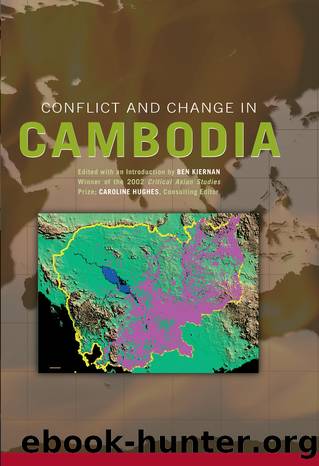Cambodia's Economic Transformation by Caroline Hughes & Kheang Un

Author:Caroline Hughes & Kheang Un [Hughes, Caroline & Un, Kheang]
Language: eng
Format: epub
Tags: Business & Economics, Economic History, History, Asia, Southeast Asia, Social Science, Anthropology, Cultural & Social
ISBN: 9788776940836
Google: HxAikgAACAAJ
Barnesnoble:
Goodreads: 15920198
Publisher: NIAS
Published: 2011-01-15T06:53:07+00:00
In the last statement, in particular, âfreedomâ is associated with salvation from violence and corruption, and âdictatorshipâ with loss of national identity and territory. The conflation of âdemocracyâ with the SRP and/or Funcinpec, in opposition to the âdictatorshipâ of the âruling party,â reflects the opposition of Khmer and âyuonâ in Khmer-language propaganda, and the connection of these with equivalent oppositions of violence/peace, corruption/moral integrity, and patriotism/treason.
The conflation of issues of democracy and Khmer moral rebirth disguised distinct perceptions of the meaning and function of the election, between local NUF supporters and potential international interveners. While the downplaying of the Vietnamese issue in statements released internationally by the party leaders must have been deliberate, little attention was apparently paid to whether this difference was symptomatic of deeper divergencies in stance between foreign liberal democratic observers and the parties. The ease with which strategies for beckoning international support skated over this difference entailed that Rainsy and Ranariddh continued to seek international backing for their cause, and their supporters continued to demonstrate to this end, even after international monitors had declared their belief that the elections constituted âa successful exercise in national self-determination.â38
The narrow CPP victory was viewed with incredulity by Funcinpec, the SRP, and their supporters. The between these reactions and international reactions to the election result brought the different views of the meaning and function of elections into sharp relief. Initially, rejection of the election result by Funcinpec and the SRP emerged in part from a refusal to believe that their fellow countrymen could have voted against national independence and âtrue democracyâ as embodied by their respective parties, when given the opportunity in a reasonably free election. This refusal was widely shared among demonstrators interviewed. International observers, by contrast, viewed a peaceful election process in which there was no systematic evidence of fraud, as legitimizing the CPP as the elected representatives of the Cambodian popular will, as constituted on polling day.
More fundamentally, for the Funcinpec, the SRP, and their supporters, the CPP were the antithesis of popular sovereignty because of their supposed relationship with Vietnam. The conflation of their own parties with Khmer selfdetermination, moral regeneration, and democracy entailed that an election that returned a CPP government could not by definition be authoritative, rightful, or democratic for these parties. Evidence was sought to support this a priori conviction, and in response, individuals increasingly came forward as the postelection campaign of nonrecognition gained momentum, to make accusations of varying credibility. This evidence never mounted sufficiently to make a compelling case for sustained fraud, in the eyes of most international observer groups. Yet for the parties in question, the CPP victory represented a defeat of sovereignty and could not therefore also be an expression of it. Consequently, thousands of these partiesâ supporters insisted upon a view of the election as a corruption, rather than an expression, of Cambodian aspirations.
It is significant in this regard that thousands of protestors campaigned vigorously in an attempt to persuade the âinternational communityâ to reverse its assessment of the elections.
Download
This site does not store any files on its server. We only index and link to content provided by other sites. Please contact the content providers to delete copyright contents if any and email us, we'll remove relevant links or contents immediately.
International Integration of the Brazilian Economy by Elias C. Grivoyannis(106932)
The Radium Girls by Kate Moore(12003)
Turbulence by E. J. Noyes(8008)
Nudge - Improving Decisions about Health, Wealth, and Happiness by Thaler Sunstein(7678)
The Black Swan by Nassim Nicholas Taleb(7088)
Rich Dad Poor Dad by Robert T. Kiyosaki(6578)
Pioneering Portfolio Management by David F. Swensen(6275)
Man-made Catastrophes and Risk Information Concealment by Dmitry Chernov & Didier Sornette(5981)
Zero to One by Peter Thiel(5768)
Secrecy World by Jake Bernstein(4727)
Millionaire: The Philanderer, Gambler, and Duelist Who Invented Modern Finance by Janet Gleeson(4448)
The Age of Surveillance Capitalism by Shoshana Zuboff(4267)
Skin in the Game by Nassim Nicholas Taleb(4224)
The Money Culture by Michael Lewis(4174)
Bullshit Jobs by David Graeber(4162)
Skin in the Game: Hidden Asymmetries in Daily Life by Nassim Nicholas Taleb(3976)
The Dhandho Investor by Mohnish Pabrai(3744)
The Wisdom of Finance by Mihir Desai(3720)
Blockchain Basics by Daniel Drescher(3565)
